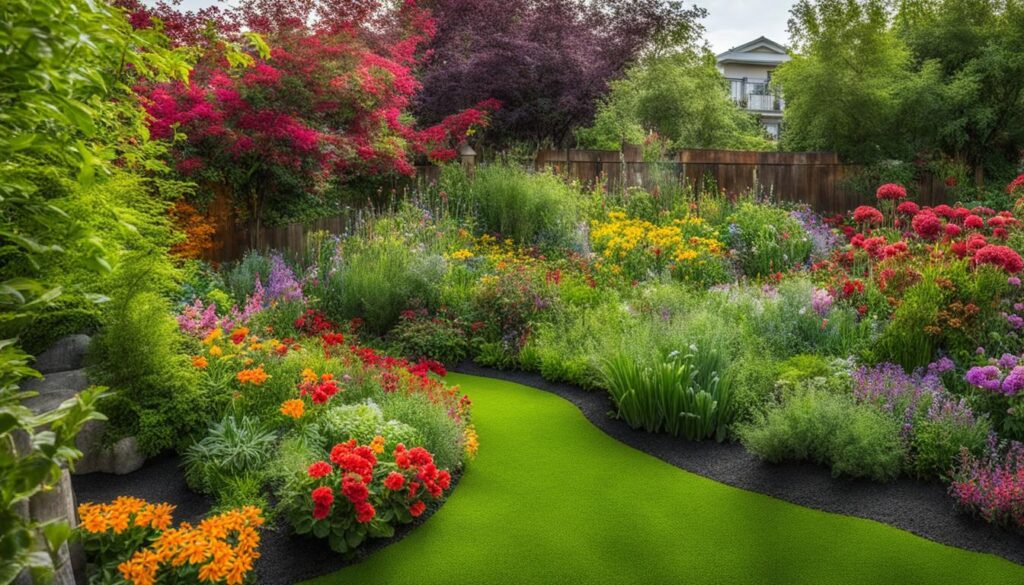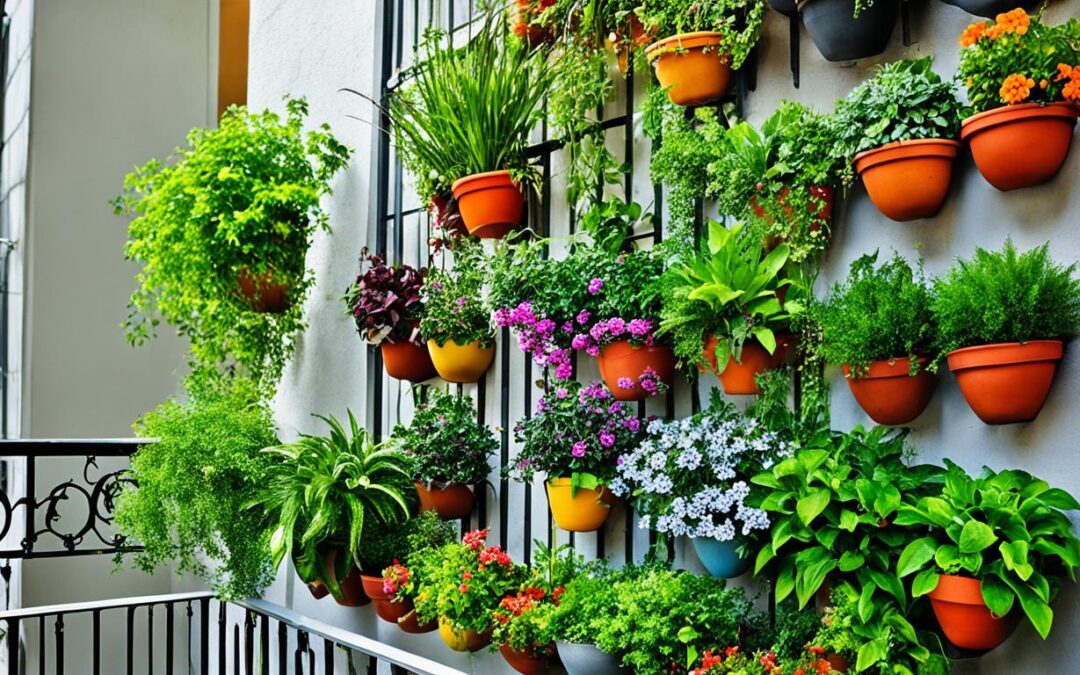Welcome to the world of urban gardening, where green spaces bloom in the midst of bustling cities. Urban gardening is a growing trend that has the power to transform your living space into a vibrant and sustainable oasis. By harnessing the power of nature, you can create a thriving garden right in your own home or community.
Urban gardening offers a multitude of benefits that go beyond just beautifying your surroundings. It allows you to take control of your food sources, reduce your carbon footprint, and foster a sense of community among neighbors. Whether you have a small balcony or a spacious backyard, urban gardening can be adapted to fit any living space.
Imagine stepping outside your door and plucking fresh herbs, luscious fruits, and vibrant vegetables to enjoy in your meals. With urban gardening, you can have access to a bountiful harvest right at your fingertips. Not only does this provide you with nutritious and delicious produce, but it also reduces your reliance on traditional grocery stores.
In addition to the culinary delights, urban gardening also has a positive impact on the environment. By cultivating your own green space, you contribute to improving air quality, reducing stormwater runoff, and creating habitat for local wildlife. You become an active participant in the movement towards a more sustainable and eco-friendly future.
Not only does urban gardening benefit you personally, but it also has a ripple effect on your community. It brings people together, creating tight-knit communities where knowledge and experiences are shared. By starting a garden, you can inspire others to do the same and foster a sense of pride and accomplishment.
So why wait? Join the urban gardening revolution and transform your living space into a thriving green sanctuary. Start small with a few potted plants or go big with a community garden project. The possibilities are endless, and the rewards are plentiful.
The Benefits of Urban Gardening
Urban gardening provides numerous benefits both to individual gardeners and their communities. By engaging in urban gardening, you can enjoy fresh produce right in the heart of your city, especially in underserved communities.
Imagine picking ripe tomatoes, crisp lettuce, and vibrant herbs from your own urban garden, just steps away from your front door.
Not only does urban gardening provide access to fresh and healthy food, but it also contributes to improved air quality. As plants absorb carbon dioxide and release oxygen, urban gardens function as natural air purifiers, creating a healthier environment for everyone.
Take a deep breath and enjoy the fresh air created by your own urban oasis.
Moreover, urban gardening plays a crucial role in community building. By cultivating a garden in a shared space, you can connect with your neighbors, share experiences, and build lasting friendships. Urban gardens become places of gathering and collaboration, fostering a sense of belonging and togetherness.
Picture yourself chatting with your neighbors, exchanging gardening tips or recipes made with the bounty from your gardens.
To further illustrate the benefits of urban gardening, here is a table highlighting the positive impacts of this practice:
| Benefit | Description |
|---|---|
| Fresh Produce | Access to fresh and nutritious food, reducing reliance on grocery stores |
| Air Quality | Plants absorb carbon dioxide and release oxygen, improving air quality |
| Community Building | Shared gardening spaces foster connections and bonding among neighbors |
As you can see, urban gardening offers a myriad of benefits for individuals and communities alike. From providing fresh produce to enhancing air quality and promoting community building, this practice has the power to transform our living spaces into vibrant and sustainable environments.
Access To Fresh, Healthy Food
Urban gardening provides you with direct access to fresh, healthy food right at your fingertips. By growing your own fruits and vegetables, you can enjoy the delicious taste and nutritional benefits of freshly harvested produce. Say goodbye to frequent trips to the supermarket and hello to a bountiful garden filled with goodness.
When you cultivate your own urban garden, you have control over the growing conditions. You can choose to grow your produce organically, avoiding the use of harmful chemical pesticides. Instead, you can opt for natural amendments like compost, which nourish the soil and promote plant health.
Gardening not only provides you with fresh, chemical-free food but also promotes physical and emotional well-being. Research has shown a positive link between gardening and higher emotional well-being scores. Engaging in the process of growing and nurturing plants can reduce stress, improve mood, and boost overall happiness.
Grow Your Own Food, Reap the Benefits
By growing your own food in an urban setting, you are not only ensuring access to fresh and healthy produce, but you are also contributing to food security in your community. Urban agriculture plays a crucial role in addressing food access issues, especially in underserved areas where fresh food may be scarce.
Gardening is a rewarding and fulfilling activity that brings you closer to nature and fosters a deeper appreciation for the food you consume. Plus, there’s a sense of pride and satisfaction that comes from harvesting your own homegrown crops. You can be confident in the quality and freshness of the food on your table, knowing that it was grown with care in your own urban oasis.
So, why wait? Join the urban gardening movement today and start enjoying the taste, health benefits, and fulfillment that come with growing your own fresh, healthy food in the heart of the city.
Reduced Greenhouse Gas Emissions, Improved Air and Soil Quality
Urban gardening is not only beneficial for individuals and communities, but it also plays a significant role in reducing greenhouse gas emissions and improving air and soil quality. By engaging in sustainable gardening practices, urban gardeners contribute to a greener, healthier environment.
One of the ways urban gardening helps reduce greenhouse gas emissions is by cutting down on the transportation needed for produce. When you grow your own fruits and vegetables in your backyard or community garden, you eliminate the need for long-distance shipping and reduce the carbon footprint associated with food production and distribution.
Furthermore, sustainable gardening methods in urban settings promote improved air and soil quality. By adopting organic practices and avoiding the use of polluting tools and pesticides, urban gardeners create a healthier environment for plants, animals, and humans alike. This focus on sustainable gardening helps to preserve biodiversity, support local ecosystems, and create habitats for wildlife.
Urban gardens also play a role in combating the urban heat island effect, where cities are significantly warmer than surrounding rural areas. Through the process of transpiration, plants release moisture into the air, cooling the surrounding environment and improving local air quality. By incorporating more green spaces through urban gardening initiatives, cities can mitigate the negative effects of urbanization on air quality and temperature regulation.
By participating in urban gardening and practicing sustainable gardening methods, you are not only growing your own food and enjoying the benefits of fresh produce, but you are also making a positive impact on the environment. The reduction in greenhouse gas emissions, improved air and soil quality, and the creation of a greener, more sustainable urban landscape are some of the significant contributions urban gardeners make to build a more resilient future.
Create Tight-Knit Communities and Break Social Boundaries
Urban gardening goes beyond growing plants. It serves as a catalyst for community building and a platform for social engagement. By participating in urban gardens, you not only contribute to local food production but also create opportunities for healthy outdoor activities and interactions among people from different backgrounds and ages.
One of the ways urban gardens promote community building is through shared efforts and experiences. Gardening enthusiasts come together, exchanging knowledge, tips, and stories, fostering a sense of belonging and camaraderie. These spaces become vibrant hubs where neighbors connect, forming tight-knit communities built on shared interests and the love for nature.
Moreover, urban gardens have a significant impact on reducing food wastage. By composting organic waste and sharing excess produce, these gardens actively contribute to the responsible consumption of resources. Food waste reduction not only benefits the environment but also helps alleviate food insecurity in communities. It is a tangible way to break social boundaries and address the issue of unequal access to nutritious food.
When you join an urban garden, you become part of a collective effort to create a sustainable and inclusive society. These gardens offer a unique opportunity to bridge divides and foster social cohesion. Regardless of your background or expertise, urban gardens provide a common ground for cooperative learning, collaboration, and a shared purpose.
Benefits of Community Building in Urban Gardens:
| Benefits | Description |
|---|---|
| Enhanced social connections | Urban gardens bring people together, fostering relationships and a sense of community. |
| Shared knowledge and resources | Participants can exchange gardening techniques, tips, and even tools, promoting a culture of cooperation and support. |
| Improved well-being | Engaging in gardening activities and spending time outdoors positively affects mental and physical health. |
| Promotion of cultural exchange | Urban gardens attract individuals from diverse backgrounds, creating opportunities for cultural sharing and understanding. |
| Empowerment and skill development | Participating in urban gardens empowers individuals by allowing them to grow their own food and develop gardening skills. |
In essence, urban gardening transcends its primary purpose of food production. It serves as a powerful tool for community building, social engagement, and reducing food waste. By nurturing urban gardens, we cultivate not just plants but also stronger, more connected communities that break social boundaries and promote a sustainable future.
Urban Garden Supplies To Get Started
To embark on your urban gardening journey, it’s essential to have the right supplies at hand. Whether you’re starting a small garden in your own backyard or planning a community gardening project, having the proper tools and equipment will set you up for success. Here are some urban garden supplies you’ll need to get started:
1. Tools for Cultivating and Planting
For preparing the soil and planting your seeds or seedlings, you’ll need several tools:
| Tools | Description |
|---|---|
| Spade | A sturdy spade will help you loosen and turn the soil, making it easier for plants to establish their root systems. |
| Trowel | A trowel is ideal for digging small holes, transplanting seedlings, and maneuvering around delicate plants. |
| Hand Pruners | Hand pruners are essential for trimming and shaping plants, removing dead or diseased foliage, and maintaining overall plant health. |
2. Watering Systems
Proper watering is crucial for the success of your urban garden. Depending on the size and layout of your garden, different watering systems may be appropriate:
| Watering Systems | Description |
|---|---|
| Watering Can | A watering can is suitable for small gardens or container plants, allowing you to control the amount of water you distribute directly to the plants’ roots. |
| Hose and Sprinkler | If you have a larger garden area, a hose and sprinkler system can provide even coverage and make watering more efficient. |
| Drip Irrigation | Drip irrigation systems help conserve water by delivering a slow, steady supply directly to the base of plants, reducing the risk of over-watering. |
3. Storage and Organization
If you’re planning a community garden, effective storage and organization are vital to ensure smooth operations and encourage collaboration. Consider the following:
| Considerations | Description |
|---|---|
| Shared Tool Storage | Designate a shed, tool rack, or storage space to house shared tools and equipment, making them easily accessible for all community members. |
| Garden Design Plans | Develop design plans for individual plots, considering factors such as plot size, orientation, and accessibility to maximize efficiency and aesthetics. |
| Membership or Fee Structures | Create membership guidelines or fee structures to sustain and support the community garden, ensuring everyone contributes to its maintenance and development. |
| Meeting Schedules | Establish regular meeting schedules to discuss garden-related matters, encourage collaboration, and ensure effective communication among community members. |
| Plot Assignment Rules | Set clear rules for plot assignments, ensuring fair distribution and promoting a harmonious gardening experience for all community members. |
By gathering the essential urban garden supplies and implementing effective organization and collaboration strategies, you’ll be well-prepared to embark on your urban gardening adventure. These supplies and systems will help you create a thriving green oasis in the heart of your city or foster a sense of community and connection through a shared gardening experience.
Benefits of Urban Gardening for the Environment, Economy, and Society
Urban gardening offers a multitude of benefits that extend beyond individual gardeners and their communities. Let’s explore the positive impact it has on the environment, economy, and society.
Environmental Benefits
By practicing sustainable gardening methods, urban gardens contribute to environmental protection. They reduce the need for transportation of produce, thereby lowering carbon emissions. Sustainable gardening practices, such as avoiding chemical pesticides and promoting organic methods, help maintain soil quality and biodiversity. Furthermore, urban gardens can serve as green spaces, mitigating the urban heat island effect and providing habitats for pollinators and other wildlife.
Economic Benefits
Urban gardening stimulates local economies and supports local food producers. When people grow their own food, they reduce their dependence on commercial supermarkets, thereby keeping their money within the local community. Additionally, urban gardens create job opportunities in areas such as urban agriculture, landscaping, and farmers markets. By supporting local food production, urban gardening enhances food security and ensures a more resilient and self-sufficient food system.
Social Benefits
Urban gardens go beyond providing fresh produce; they foster community connections and address social issues. Community gardens, in particular, bring people together, encouraging social interaction and building relationships. They create a sense of belonging, allowing individuals from diverse backgrounds and ages to share experiences, knowledge, and resources. Moreover, urban gardening promotes physical and mental well-being, providing opportunities for outdoor activities, stress reduction, and a sense of fulfillment.

Start Your Garden, Grow a Community
Urban agriculture is already a significant part of many cities, and as more communities recognize its value, more people are joining in urban gardening to enjoy the benefits. Starting an urban garden is not only a rewarding experience but also a way to contribute to building resilient cities and fostering thriving communities.
By embarking on the journey of starting your own urban garden, you can play a vital role in promoting sustainability. Growing your own food allows you to reduce your reliance on external food sources, thereby reducing the carbon footprint associated with transportation. It also enables you to embrace organic gardening practices, which promote healthier soil and help conserve valuable resources.
Urban gardening goes beyond just growing plants – it provides a platform for building well-rooted communities. As you cultivate your garden, you create opportunities for social interaction, collaboration, and knowledge-sharing with fellow gardeners. Sharing gardening tips, excess produce, and gardening experiences not only strengthens community bonds but also fosters a sense of belonging and cooperation.
By participating in urban agriculture, you become part of a larger movement that seeks to transform our cities into vibrant, self-sufficient, and sustainable ecosystems. Your journey as an urban gardener can inspire others to follow suit, creating a ripple effect that resonates throughout the community. So, grab your garden tools, sow the seeds of change, and watch as your little plot of land becomes a catalyst for bigger transformations.

